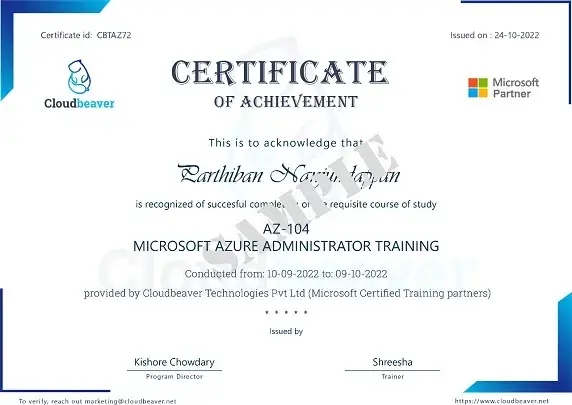DP 900: Microsoft Azure Data Fundamentals
Module 1: Explore fundamentals of data
Core data concepts
- What is data?
- How is data stored?
- Transactional data workloads
- Analytical data workloads
Data roles and services
- Data professional roles
- Microsoft cloud services for data
Module 2: Explore fundamentals of relational data in Azure
Explore relational data concepts
- Relational tables
- Normalization
- Structured Query Language (SQL)
- Other common database objects
Explore Azure services for relational data
- Azure SQL
- Azure Database services for open-source
Lab:Provision Azure relational database services
Module 3:Explore fundamentals of non-relational data in Azure
Fundamentals of Azure Storage
- Azure Blob Storage
- Azure Data Lake Store Gen 2
- Azure Files
- Azure Table Storage
Lab: Explore Azure Storage
Fundamentals of Azure Cosmos DB
- What is Azure Cosmos DB?
- Azure Cosmos DB APIs
Lab: Explore Azure Cosmos DB
Module 4: Explore fundamentals of data analytics
Large-scale data warehousing
- What is large-scale data warehousing?
- Data ingestion and processing pipelines
- Analytical data stores
- Choose an analytical data store service
Lab: Explore Azure Synapse Analytics
Streaming and real-time analytics
- Batch vs stream processing
- Real-time data processing with Azure Stream Analytics
- Real-time log and telemetry analysis with Azure Data Explorer
Lab: Analyze streaming data
Data visualization
- Introduction to data visualization with Power BI
- Analytical data modeling
- Common data visualizations in reports
Lab: Visualize data with Power BI
DP-203: Data engineering on Microsoft Azure
Module 1: Explore compute and storage options for data engineering workloads
- Introduction to Azure Synapse Analytics
- Describe Azure Databricks
- Introduction to Azure Data Lake storage
- Describe Delta Lake architecture
- Work with data streams by using Azure Stream Analytics
Module 2: Run interactive queries using Azure Synapse Analytics serverless SQL pool
- Explore Azure Synapse serverless SQL pools capabilities
- Query data in the lake using Azure Synapse serverless SQL pools
- Create metadata objects in Azure Synapse serverless SQL pools
- Secure data and manage users in Azure Synapse serverless SQL pool
Module 3: Data exploration and transformation in Azure Databricks
- Describe Azure Databricks
- Read and write data in Azure Databricks
- Work with DataFrames in Azure Databricks
- Work with DataFrames advanced methods in Azure Databricks
Module 4: Explore, transform, and load data into the data warehouse using Azure Synapse Analytics Apache Spark
- Understand big data engineering with Apache Spark in Azure Synapse Analytics
- Ingest data with Apache Spark notebooks in Azure Synapse Analytics
- Transform data with DataFrames in Apache Spark Pools in Azure Synapse Analytics
- Integrate SQL and Apache Spark pools in Azure Synapse Analytics
Module 5: Ingest and load data into the data warehouse
- Use data loading best practices in Azure Synapse Analytics
- Petabyte-scale ingestion with Azure Data Factory or Azure Synapse Pipelines
Module 6: Transform data with Azure Data Factory or Azure Synapse Pipelines
- Data integration with Azure Data Factory or Azure Synapse Pipelines
- Code-free transformation at scale with Azure Data Factory or Azure Synapse Pipelines
Module 7: Orchestrate data movement and transformation in Azure Data Factory or Azure Synapse Pipelines
- Orchestrate data movement and transformation in Azure Data Factory or Azure Synapse Pipelines
Module 8: End-to-end security with Azure Synapse Analytics
- Secure a data warehouse in Azure Synapse Analytics
- Configure and manage secrets in Azure Key Vault
- Implement compliance controls for sensitive data
Module 9: Support Hybrid Transactional Analytical Processing (HTAP) with Azure Synapse Link
- Design hybrid transactional and analytical processing using Azure Synapse Analytics
- Configure Azure Synapse Link with Azure Cosmos DB
- Query Azure Cosmos DB with Apache Spark for Azure Synapse Analytics
- Query Azure Cosmos DB with SQL serverless for Azure Synapse Analytics
Module 10: Real-time stream processing with Azure Stream Analytics
- Enable reliable messaging for Big Data applications using Azure Event Hubs
- Work with data streams by using Azure Stream Analytics
- Ingest data streams with Azure Stream Analytics
Module 11: Create a stream processing solution with Event Hubs and Azure Databricks
- Process streaming data with Azure Databricks structured streaming






















